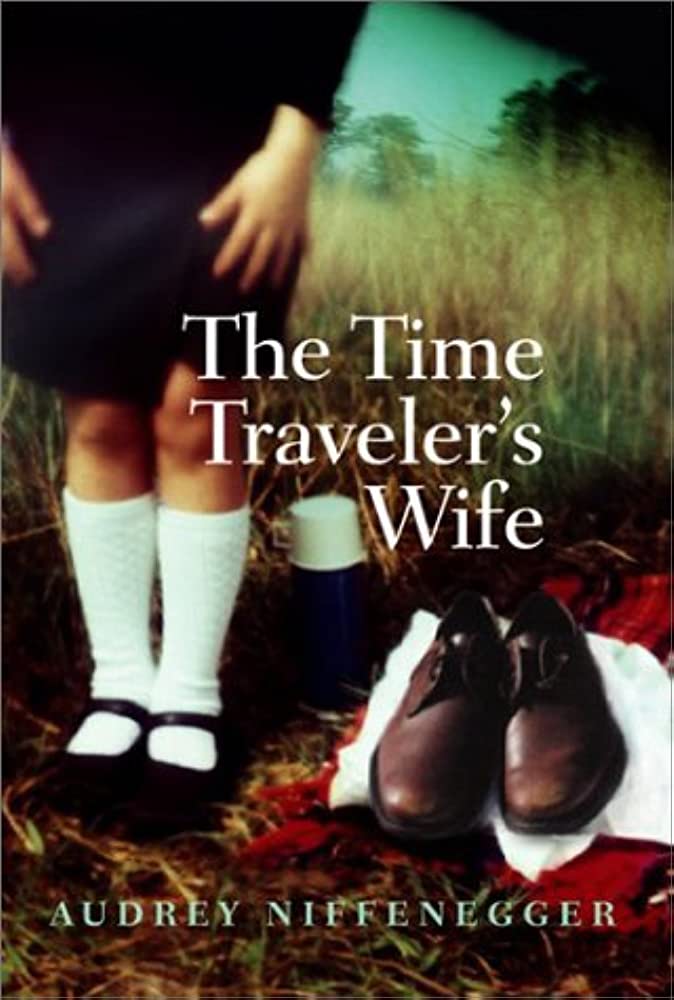The Time Traveller’s Wife by Audrey Niffenegger is at its core an old-fashioned love story of Henry and Clare. But what makes it original is that one of the lovers is a time traveler, as the name of the book suggests. Niffenegger has the perfect explanation for Henry’s time travel.
Henry has a genetic condition that makes him time travel to the past or future involuntarily. He does not have any control over when it happens, where he travels to or what point in time he travels to, or how long he would remain there. In addition to this, traveling in time makes him hungry and anything that is not a part of his body gets left behind. This means that Henry disappears out of the blue leaving behind a pile of clothes and pops up at some point in space-time completely naked and starving. As opposed to a normal person, like Clare, time for Henry is not a straight line.
In the normal time sequence, Henry is just 8 years older than Clare. But Clare meets Henry for the first time at just 6 years old, when a 36-year-old Henry from the future pops up in front of Clare on a clearing on the grounds of her home where she spends most of her time. Henry gives his time-traveling explanation to the terrified 6-year-old whose disbelief turns to conviction on seeing him disappear. Henry happens to frequent the spot since then throughout Clare’s childhood and teenage years. Clare starts to expect him and finds ways to help Henry with a hidden supply of clothes and food on each appearance. The inquisitive child at some point realizes that this naked man from the future is going to be her husband and that realization turns to love during her teenage years. The future Henry is already married to Clare in his own time and he does nothing to discourage Clare’s love. All this while, the present-time Henry, who is just 8 years older than Clare goes through his life unaware of her existence as he is not yet 36. By the time real-time Henry meets Clare, Clare had a lot of history with him but he doesn’t know her at all. They meet in real-time in their 20s, and after hearing about his future from Clare, Henry falls in love in the present.
The book is written in the first-person perspective of both Henry and Clare and alternates between the two.
The prologue starts with Clare explaining her feelings on constantly being left behind, waiting for Henry to come back to real-time from his time travel, not knowing when or even whether he would come back. And Henry talks about it feels to leave Clare behind and be at the whim of time. Then, the book is divided into 3 parts. The first part named ‘The Man Out of Time’ sets the entire premise. It describes Henry’s and Clare’s childhood, Henry’s time travels, their family, their interactions, and the development of their love. The book follows them from their childhood to their marriage in adulthood. The second part follows their marital life in the present time. The third part is all about loss, grief, longing, and the power of hope and expectation.
From the beginning, the tone of the book is one foreshadowing loss and tragedy. This sets an expectation of the entire plot from the very beginning. The love story follows the normal romantic trope and all the substance of the story comes from the time-travel wrinkle. The time-traveling premise is convincingly written, and the experiences are well-detailed. I can almost imagine having a friend Henry who can time travel. Niffenegger is able to convince us that her fantasy backdrop is just a genetic condition and grounds the entire story on reality.
The book is a long one; it’s over 500 pages. Although beautifully crafted, I felt the author went a bit overboard with the details in a few places. For example, Clare is a visual artist in the story. Niffenegger is a visual artist in real life. So, understandably there are a lot of details on Clare’s creative process that a normal reader, like me, couldn’t relate to and I found myself skimming through those details.
The greatest disappointment for me was that the characters are not explored enough, especially for a long book. The book is mostly filled with incidents; they are interesting and well-written but the emotions of the characters are described almost at a surface level. The 2 protagonists are not very likable characters; I am completely ok with that. I love somewhat unlikable characters as they offer a great opportunity of exploring the thoughts and complexities of being human. To me, great literature is when it presents an unlikeable character, explores him/her, and makes us empathize and root for them. But that’s not what happens here. Even in situations when we should really feel for them, the lack of depth keeps them at a distance. This is not just the case for Clare and Henry. There are a rich array of characters – Clare’s mother Lucille, Henry’s ex-girlfriend, Clare’s best friends Charisse and Gomez, Henry’s friend Ben, Henry’s doctor Kendrick … Charisse and Lucille, in particular, are interesting characters whose perspectives and emotions I would have loved to know. The only character I could empathize with was Henry’s father whose story justifies his actions.
Another complaint I have is the lack of character development. The book essentially follows those 2 characters from childhood to adulthood. The adult Clare going through love and longing is the same teenage Clare. The adult Henry is the same old Henry, except that he stopped being a womanizer. This again is related to my above point of lack of examination of the characters. And because of this, the characters of Clare and Henry were not that relatable. Even their love story is not very convincing. In retrospect, I do not remember any vulnerable conversations between them, just that they had lots of sex. Henry’s excessive sex drive is attributed to the time travel, but I do think the sex was also used to convey their love to the readers and it backfired. It would have been great if a few of those parts were replaced with real vulnerable conversations that communicate the depth of their love. In fact, throughout the book, their love lacks communication, which is the very foundation of a good relationship.
Despite all the above flaws, Niggeneger succeeds in captivating the readers till the end. It is beautifully written, and witty at times. All the incidents from Henry’s and Clare’s childhood and all the various scenes that play out in the book are handled with great skill. The observations and nuances are appreciable. The curiosity and innocence of child Clare, the behavior and feelings of teenage Clare are perfectly captured. The fantasy backdrop and range of characters, though somewhat underutilized, are inventive and do make an ordinary love story into an extraordinary book.
The writing is very engaging. The constant back and forth in time may confuse some people, but I think it acts as a testimony of Henry having no control over his life. The use of symbolism and vivid imagery elevates the writing to another level. There are parts where Clare uses her art to express herself and Niffenegger skillfully projects Clare’s emotions through the process. These segments of Clare’s artistic expression are beautiful, powerful, and touching at the same time; it is in those parts that I loved this book and it is those parts that stand out in my mind. They demonstrate Niffenigger’s flair as an artist and her ability to weave her art into the story is commendable.
The greatest success of this book is that it forces us to think, about our life, our past, and our future. Throughout the book, we are told that we cannot change the past or future and everything that is happening has already happened. Time is a closed loop. But still, we wonder; What if Henry had not convinced young Clare that she cannot change the future? What if young Clare never figured out that Henry was her husband early on and hence never fell in love with him? What if Clare didn’t blindly believe Henry about the future being unchangeable and decided to test it out on her own? Is the future really set in stone? Did everything happen the way it happened because they believed it should happen that way and forced it?
We may never know.
Rating: 3.7/5

